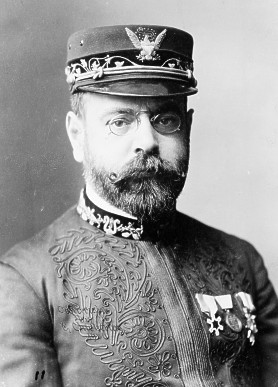
Kansas Snapshots by Gloria Freeland - Feb. 10, 2012
Sousa's music again marches into Manhattan
Husband Art and I were excited when we learned that Kansas State University's Hale Library Concert Series would include a program dedicated to John Philip Sousa. Musical tastes have changed so much in the past century that Sousa's name has almost disappeared. But at one time, he was as big as any rock star is today.
Sousa's first visit to Manhattan was on Oct. 5, 1904 when he played a concert at the Wareham Opera House. He also performed at Kansas State Agricultural College (now Kansas State University) twice on Dec. 15, 1925 and twice again on Oct. 10, 1928.
On his last visit, the KSAC student body president presented Sousa a purple suede petition with 600 signatures, requesting that he compose a march and dedicate it to KSAC. He completed his "Kansas Wildcat March" piano arrangement in 1931 and it is now an integral part of the K-State Marching Band's pre-game show at every football game.
The only Sousa pieces I was familiar with before the Feb. 3 concert were his marches - including "Stars and Stripes Forever" and "Semper Fidelis" - the official song of the Marine Corps. But I discovered Sousa also wrote many other musical pieces, including operettas, popular songs, and other compositions.
While Sousa first became famous while serving as the leader of the U.S. Marine Band, he later left the service and formed the Sousa Band, which toured for nearly 40 years and entertained millions of people.
The concert this past Friday night commemorated the 100th anniversary of Sousa's round-the-world tour that began in 1910 and ended in 1911.
Craig B. Parker, a K-State music faculty member, has had a life-long interest in Sousa's music and band. He served as the emcee for the concert. Before the show began, he joked with those of us on the front row that we might want to move back because we were in the "spray zone." Some moved, but Art and I didn't. Parker also shared details of Sousa's world tour, the pieces they played and the soloists performing them.
The world tour included 474 concerts in 13 months. His musicians traveled 47,552 miles on trains and ships on the tour, which wasn't without its problems. Among those problems were Sousa's bout with malaria, a storm at sea, an incident in which his soprano and violinist were rendered unconscious by a faulty gas line in their dressing room, and a rickety stage extension that fell apart during one concert. The world tour included two stops in Kansas - one in Parsons and one in Pittsburg.
All but one of the compositions in Friday's program were in his world tour repertoire. Among numbers performed were: Sergei Rachmaninoff's "The Bells of Moscow," Herbert Clarke's "My Love for You," Richard Wagner's "O, Evening Star," George Handel's "Largo" and Sousa's "The Goose-Girl's Song," "Maid of the Meadow" and "The Federal March."
But Sousa's interests extended beyond music. He was considered to be one of the all-time great trapshooters and organized the first national trapshooting organization. He was quoted as saying, "Let me say that just about the sweetest music to me is when I call, 'pull,' the old gun barks, and the referee in perfect key announces, 'dead.'"
He also wrote several books, including his autobiography.
So, while we had arrived expecting to hear some good music and were not disappointed in this regard, we ended up leaving with a much greater appreciation of the man once called "America's March King."

Sousa in one of his band uniforms.
Comments? [email protected].
Earlier columns from 2012 may be found at: 2012 Index.
Links to previous years are on the home page: Home